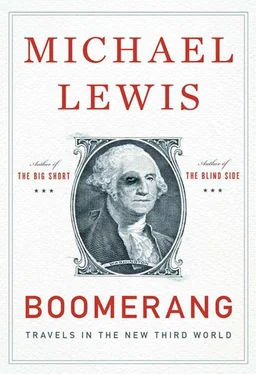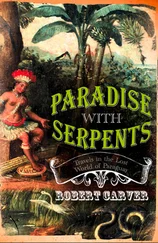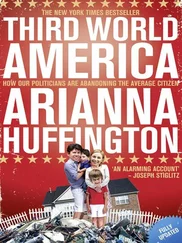A bell rings for a vote, and Irish politicians stream in. A few minutes before the vote, the doors to their chamber will be closed and guarded. A politician who is late is a politician who cannot vote. A glass barrier separates the visitors’ gallery and the floor: I ask my tour guide about it. “It’s not to stop people from throwing things at their government,” she says, then goes on to explain. Some years ago an Irish politician came late, after the doors had been locked. He ran up to the visitors’ gallery, jumped down from it into the press gallery, ten feet below, and from there rappelled down the wall to the floor. They allowed the vote, but put up the glass barrier. They disapproved of the loophole, but rewarded the guy with the wit to exploit it. This, she claims, is very Irish.
The first to take his seat is Bertie Ahern, the prime minister from June 1997 until May 2008 and Political Perp No. 1. Ahern is known both for a native shrewdness and for saying lots of spectacularly dumb-sounding things that are fun to quote. Tony Blair has credited him with a kind of genius in how he brokered the Northern Ireland peace negotiations; on the other hand, seeking to explain the financial crisis, he actually said, “Lehman’s was a world investment bank. They had testicles everywhere.” Ahern spent his last days in office denying he’d accepted bribes from property developers, at least in part because so much of what he did in office seemed justified only if he were being paid by property developers to do it. But Bertie Ahern, too, obviously believed in the miracle of Irish real estate. After Morgan Kelly published his article predicting the collapse of the Irish banks, for instance, Ahern famously responded to a question about it by saying, “Sitting on the sidelines cribbing and moaning is a lost opportunity. I don’t know how people who engage in that don’t commit suicide.”
Now Ahern is just another Irish backbencher, with a hangdog slouch and a face mottled by broken capillaries. To fill the empty hours he’s taken a second job writing a sports column for the Rupert Murdoch Sunday tabloid News of the World , which just might be the least respectable job in global journalism. *Ahern’s star, such as it was, has fallen. When the Irish land boom flipped from miracle to catastrophe, a lot of important people’s status, along with perhaps their sense of themselves, flipped with it. An Irish stockbroker has told me that many of the former bankers, some of whom he counts as clients, “actually physically look different.” He’d just seen the former CEO of Allied Irish Banks, Eugene Sheehy, in a restaurant, being heckled by other diners. Sheehy once had been a smooth, self-possessed character whose authority was beyond question. “If you saw the guy now,” says my stockbroker friend, “you’d buy him a cup o’ tea.”
The Irish real estate bubble was different from the American version in many ways. It wasn’t disguised, for a start. It didn’t require a lot of complicated financial engineering beyond the understanding of mere mortals. It also wasn’t as cynical. There aren’t a lot Irish financiers, or real estate people, who have emerged with a future. In America the banks went down but the big shots in them still got rich; in Ireland the big shots went down with the banks. Sean Fitzpatrick, a working-class kid turned banker who built Anglo Irish Bank more or less from scratch, is widely viewed as the chief architect of Ireland’s misfortune: today he is not merely bankrupt but unable to show his face in public. Mention his name and people with no interest in banking will tell you with disgust how he disguised millions of euros of loans made to himself by his own bank. What they don’t mention is what he did with the money: invested it in Anglo Irish bonds! When the bank failed Fitzpatrick was listed among its creditors, having (in April 2008!) purchased five million euros of Anglo Irish subordinated floating rate notes.
The top executives of all three big banks operated in a similar spirit: they bought shares in their own companies right up to the moment of collapse, and continued to pay dividends, as if they had capital to burn. Virtually all of the big Irish property developers who behaved recklessly signed personal guarantees for their loans. It’s widely assumed that they must be hiding big piles of money somewhere, but the evidence thus far suggests that they are not. The Irish Property Council has counted twenty-nine suicides by property developers since the crash—in a country where suicide often goes unreported and undercounted. “I said to all the guys, ‘Always take money off the table.’ Not many of them took money off the table,” says Dermont Desmond, an Irish billionaire who made his fortune from software in the early 1990s, and so counts as old money.
The Irish nouveau riche may have created a Ponzi scheme, but it was a Ponzi scheme in which they themselves believed. So, too, for that matter, did some large number of ordinary Irish citizens who bought houses for fantastic sums. Ireland’s 87 percent rate of homeownership is the highest in the world. There’s no such thing as a nonrecourse mortgage in Ireland: the guy who pays too much for his house is not allowed simply to hand the keys to the bank and walk away. He’s on the hook, personally, for whatever he borrowed. Across Ireland people are unable to extract themselves from their houses or their bank loans. Irish people will tell you that, because of their sad history of dispossession, owning a home is not just a way to avoid paying rent but a mark of freedom. In their rush to freedom, the Irish built their own prisons. And their leaders helped them to do it.
JUST BEFORE THE closing bell, the two men who sold the Irish people on the notion that they were responsible not merely for their own disastrous financial decisions but also for the ones made by their banks arrive in the chamber: Prime Minister Brian Cowen and Finance Minister Brian Lenihan. Along with the leader of the opposition, and the third in command of their own party, both are children of politicians who died in office: Irish politics is a family affair. Cowen happens also to have been the minister of finance from 2004 until mid-2008, when most of the bad stuff happened. He is not an obvious Leader of Men. His movements are sullen and lumbering, his face numbed by corpulence, his natural resting expression a look of confusion. One morning a few weeks before, he went on national radio sounding, to well-trained Irish ears, drunk. To my less trained ones he sounded merely groggy, but the public is in no mood to cut him a break. (Four different Irish people told me, on great authority, that Cowen had faxed Ireland’s 440-billion-euro bank guarantee into the European Central Bank from a pub.) And the truth is, if you were to design a human being to maximize the likelihood that people would assume he drank too much you’d have a hard time doing better than the Irish prime minister. Brian Lenihan, who follows on Cowen’s bovine heels, comes across, by comparison, as a decathlete in peak condition.
On this day, incredibly yet predictably, the Parliament decides not to hold a vote to fill three of its four empty seats. Then they adjourn, and I spend an hour with Joan Burton. Of the major parties in Ireland, Labor offers the closest thing to a dissenting opinion and a critique of Irish capitalism. As one of only eighteen members of the Irish House of Commons who voted against guaranteeing the banks’ debts, Burton retains rare credibility. And in an hour of chatting about this and that she strikes me as straight, bright, and basically good news. But her role in the Irish drama is as clear as Morgan Kelly’s: she’s the shrill mother no one listened to. She speaks in exclamation points with a whiny voice that gets on the nerves of every Irishman—to the point where her voice is parodied on national radio. Now, when I ask her what she would do differently from what the Irish government is doing, even she is stumped. Like every other Irish politician, she is at the mercy of forces beyond her control. The Irish bank debt is now Irish government debt, and any suggestion of default will only raise the cost of borrowing the foreign money they now can’t live without. “Do you know that Irish people are now experts on bonds?” says Burton. “Yes, they now say one hundred basis points rather than one percent! They have developed a new vocabulary!”
Читать дальше












